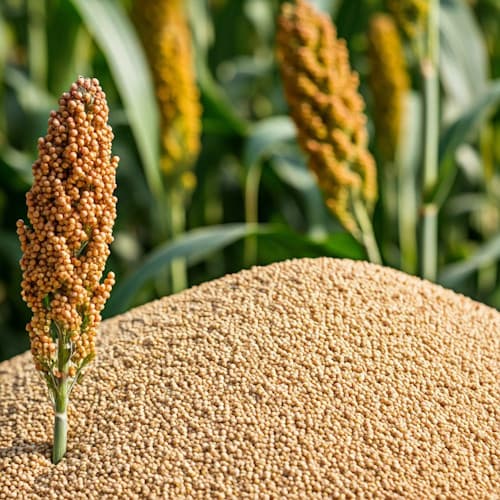




Sorgo, jedna z najbardziej odpornych na suszę upraw na świecie, kryje w sobie niewykorzystany potencjał dla spółdzielni rolniczych i firm agrobiznesowych w krajach rozwijających się. Jego odporność na zmiany klimatyczne, połączona z szerokim zastosowaniem w różnych branżach, czyni z niego cenny towar eksportowy. Szczególnie białe i czerwone odmiany sorgo są coraz bardziej poszukiwane na globalnych rynkach, obejmujących sektory spożywczy, napojów i kosmetyczny.
Globalne Trendy i Popyt na Rynku
Globalny popyt na sorgo gwałtownie wzrósł, napędzany przez kluczowe czynniki:
1. Trend Bezglutenowy: Rynek żywności bezglutenowej dynamicznie się rozwija dzięki rosnącej świadomości dotyczącej celiakii i wrażliwości na gluten, a także modzie na zdrowy styl życia. Sorgo, będące naturalnie bezglutenowe, stało się podstawowym składnikiem dla producentów żywności skierowanej do tej niszy.
2. Trendy Zdrowotne i Wellness: Konsumenci na całym świecie coraz częściej sięgają po naturalne i pełnoziarniste produkty. Profil odżywczy sorgo, bogaty w białko, błonnik i przeciwutleniacze, czyni je premium opcją w żywności, napojach i kosmetykach skoncentrowanych na zdrowiu.
3. Zrównoważony Rozwój: Dzięki niskim wymaganiom wodnym i zdolności do adaptacji w suchych warunkach, sorgo jest uprawą przyjazną dla środowiska. W miarę jak rosną obawy związane z niedoborem wody, szczególnie w Europie i Ameryce Północnej, popularność sorgo na rynkach przywiązujących wagę do ekologii stale rośnie.
Zastosowanie Sorgo w Kluczowych Branżach
1. Przemysł Spożywczy
Przemysł spożywczy pozostaje głównym motorem potencjału eksportowego sorgo:
- Produkcja Mąki: Mąka z sorgo jest podstawowym składnikiem bezglutenowych wypieków, takich jak chleb, ciastka i makaron. Na przykład w Indiach partnerstwa między spółdzielniami a eksporterami doprowadziły do 30% wzrostu eksportu mąki sorgo do USA w ciągu trzech lat.
- Zastosowanie Pełnoziarniste: Rynki europejskie i północnoamerykańskie doceniły starożytne zboża, takie jak sorgo. Firmy z Mali skutecznie wprowadziły na rynek wysokiej jakości pełnoziarniste sorgo jako zdrowszą alternatywę dla ryżu i komosy ryżowej, zdobywając pozycję w ekskluzywnych sieciach spożywczych we Francji i Niemczech.
- Prażone Sorgo: Jako zdrowa przekąska, prażone sorgo zyskuje na popularności. Spółdzielnia w Ugandzie zwiększyła eksport prażonego sorgo na Bliski Wschód, odpowiadając na zapotrzebowanie na innowacyjne, bezglutenowe opcje przekąsek.
- Pasza dla Zwierząt: W Brazylii firmy agrobiznesowe eksportujące paszę na bazie sorgo do Chin wprowadziły technologie śledzenia pochodzenia produktów, zwiększając zaufanie na rynku i podnosząc eksport o 20% w ciągu dwóch lat.
2. Przemysł Napojów
Sorgo odgrywa kluczową rolę zarówno w tradycyjnym, jak i nowoczesnym przemyśle napojów:
- Warzenie Piwa: Poza Afryką, globalne zainteresowanie tradycyjnymi piwami z sorgo gwałtownie wzrosło. W RPA browary eksportujące piwa na bazie sorgo do Wielkiej Brytanii trafiły w gusta miłośników piwa rzemieślniczego, poszukujących unikalnych i egzotycznych smaków.
- Napoje Bezalkoholowe: Firmy z Nigerii odnoszą sukcesy w eksporcie słodowanych napojów z sorgo na rynki Bliskiego Wschodu, gdzie są reklamowane jako certyfikowane halal, pożywne napoje.
- Syrop z Sorgo: W USA rosnąca popularność koktajli rzemieślniczych i naturalnych słodzików zwiększyła popyt na syrop z sorgo. Eksporterzy z Burkina Faso wykorzystali ten trend, zawierając długoterminowe umowy dostaw z firmami produkującymi napoje rzemieślnicze.
3. Przemysł Kosmetyczny
Unikalne właściwości sorgo czynią je pożądanym składnikiem w kosmetykach:
- Nawilżacze i Produkty Anti-Aging: Południowokoreańskie marki kosmetyczne coraz częściej pozyskują ekstrakt z sorgo z Etiopii ze względu na jego właściwości nawilżające i przeciwstarzeniowe, co przyczyniło się do podwojenia eksportu Etiopii w tym segmencie.
- Pielęgnacja Włosów: W Indiach produkty do pielęgnacji włosów na bazie sorgo zyskały popularność w ruchu naturalnej pielęgnacji włosów, a eksport rozszerzył się na Amerykę Północną, gdzie rośnie popyt na ekologiczne, bogate w składniki odżywcze produkty.
- Naturalne Barwniki: Czerwone sorgo stało się atrakcyjnym naturalnym barwnikiem dla europejskich producentów kosmetyków, którzy przestrzegają surowych przepisów dotyczących syntetycznych barwników. Firmy z Tanzanii skutecznie weszły na ten rynek, podkreślając swoje ekologiczne praktyki rolnicze.
Przykłady Udanych Eksportów Sorgo
1. Pełnoziarniste Sorgo z Mali w Europie: Dzięki partnerstwu z międzynarodowymi organizacjami fair trade, spółdzielnie z Mali eksportują pełnoziarniste sorgo do świadomych zdrowotnie konsumentów we Francji i Belgii, podkreślając etyczne źródła pochodzenia i zrównoważone praktyki.
2. Prażone Sorgo z Ugandy na Bliskim Wschodzie: Drobni producenci z Ugandy weszli na rynek bliskowschodni, promując prażone sorgo jako wszechstronną przekąskę i składnik do płatków śniadaniowych, odpowiadając na zapotrzebowanie na innowacyjne, bezglutenowe produkty.
3. Syrop z Sorgo z Burkina Faso w Amerykańskich Napojach Rzemieślniczych: Burkina Faso stało się kluczowym dostawcą syropu z sorgo dla amerykańskiego przemysłu napojów rzemieślniczych, wykorzystując rządowe zachęty do tworzenia kanałów eksportowych i zapewnienia konkurencyjnych cen.
Wyzwania i Strategie Sukcesu
Choć sorgo oferuje ogromny potencjał dla krajów rozwijających się, istnieje kilka wyzwań, które muszą zostać pokonane, aby w pełni wykorzystać jego globalny potencjał rynkowy. Poniżej przyglądamy się tym wyzwaniom i przedstawiamy konkretne strategie osiągnięcia sukcesu:
1. Kontrola Jakości i Standaryzacja
Wyzwanie: Spełnienie międzynarodowych standardów jakościowych stanowi dużą przeszkodę dla wielu krajów rozwijających się. Niespójna jakość, zanieczyszczenia oraz brak zgodności z globalnymi przepisami dotyczącymi bezpieczeństwa żywności mogą utrudniać dostęp do rynków i obniżać konkurencyjność.
Strategie:
- Tworzenie Laboratoriów Badawczych: Kraje rozwijające się mogą wzorować się na Kenii, gdzie spółdzielnie utworzyły laboratoria do testowania sorgo, aby zapewnić, że eksportowane produkty spełniają międzynarodowe standardy. Laboratoria te mogą badać poziom aflatoksyn, wilgotność i inne parametry jakościowe.
- Programy Certyfikacji: Uzyskanie certyfikatów, takich jak ISO, HACCP czy certyfikaty ekologiczne, może zwiększyć wiarygodność. Na przykład etiopscy eksporterzy sorgo skutecznie weszli na południowokoreański rynek kosmetyczny, przestrzegając surowych wymogów jakościowych i certyfikacji ekologicznej.
- Szkolenia dla Rolników: Dostarczanie rolnikom wiedzy na temat najlepszych praktyk w uprawie, zbiorach i przechowywaniu może poprawić jakość produktów. W Mali spółdzielnie rolnicze współpracują z organizacjami pozarządowymi, oferując warsztaty na temat zrównoważonych technik rolniczych, co przekłada się na wyższą jakość sorgo przeznaczonego na eksport.
2. Dostęp do Rynków i Bariery Handlowe
Wyzwanie: Nawigacja przez skomplikowane globalne przepisy handlowe, cła i bariery pozataryfowe może być trudna dla małych producentów i firm agrobiznesowych w krajach rozwijających się.
Strategie:
- Wykorzystanie Umów Handlowych: Kraje rozwijające się powinny aktywnie uczestniczyć w regionalnych i międzynarodowych umowach handlowych, aby zmniejszyć cła i uzyskać preferencyjny dostęp do kluczowych rynków. Na przykład kraje afrykańskie objęte Afrykańską Kontynentalną Strefą Wolnego Handlu (AfCFTA) mogą skorzystać z redukcji barier handlowych wewnątrz kontynentu, ułatwiając eksport sorgo.
- Partnerstwa z Agencjami Eksportowymi: Współpraca z narodowymi agencjami promocji eksportu może pomóc firmom zrozumieć wymagania rynkowe i pokonać bariery regulacyjne. Na przykład nigeryjscy eksporterzy współpracują z Nigerian Export Promotion Council (NEPC), aby uzyskać dostęp do rynków europejskich i bliskowschodnich.
- Analiza Rynkowa: Inwestowanie w badania rynkowe w celu identyfikacji trendów popytu, preferencji konsumentów i wymogów regulacyjnych na docelowych rynkach jest kluczowe. Eksporterzy z Ugandy skutecznie weszli na rynek bliskowschodni, dostosowując swoje produkty z prażonego sorgo do lokalnego popytu na bezglutenowe przekąski.
3. Zarządzanie Łańcuchem Dostaw i Infrastruktura
Wyzwanie: Niesprawne łańcuchy dostaw, słabe magazyny i niewystarczająca infrastruktura transportowa mogą prowadzić do strat po zbiorach, obniżenia jakości produktów i wzrostu kosztów.
Strategie:
- Inwestycje w Infrastrukturę Magazynową: Magazyny z kontrolą klimatu mogą znacząco zmniejszyć straty po zbiorach i utrzymać jakość produktów. Nigeryjscy eksporterzy zainwestowali w nowoczesne systemy przechowywania, co pozwoliło im sprostać wymaganiom międzynarodowych kupujących.
- Poprawa Logistyki: Rozwój efektywnych sieci transportowych, w tym łańcuchów chłodniczych dla produktów łatwo psujących się, takich jak syrop z sorgo, jest kluczowy. Partnerstwa publiczno-prywatne mogą odegrać ważną rolę w modernizacji infrastruktury. Na przykład rząd Burkina Faso współpracował z firmami prywatnymi, aby poprawić sieć drogową, ułatwiając eksport syropu z sorgo do USA.
- Rozwiązania Cyfrowe: Wdrożenie narzędzi cyfrowych do śledzenia łańcucha dostaw i zapewnienia przejrzystości może zwiększyć zaufanie kupujących. Brazylijscy eksporterzy wykorzystali technologię blockchain do śledzenia dostaw pasz dla zwierząt na bazie sorgo do Chin, zwiększając zaufanie na rynku i podnosząc eksport.
4. Dostęp do Finansowania i Inwestycji
Wyzwanie: Ograniczony dostęp do finansowania dla małych rolników i firm agrobiznesowych może ograniczać ich zdolność do inwestowania w poprawę jakości, infrastrukturę i ekspansję rynkową.
Strategie:
- Mikrofinansowanie i Modele Spółdzielcze: Zachęcanie do tworzenia spółdzielni rolniczych i zapewnienie dostępu do mikrofinansowania może wzmocnić małych rolników. W Mali spółdzielnie połączyły zasoby, aby zainwestować w testowanie jakości i marketing, umożliwiając eksport pełnoziarnistego sorgo do Europy.
- Inwestycje Publiczne i Prywatne: Rządy i agencje rozwojowe mogą zapewnić granty, niskooprocentowane pożyczki lub gwarancje, aby wspierać łańcuchy wartości sorgo. Na przykład rząd Etiopii współpracował z międzynarodowymi darczyńcami, aby sfinansować zakłady przetwórstwa sorgo, zwiększając eksport do przemysłu kosmetycznego.
- Crowdfunding i Inwestycje Wpływowe: Eksplorowanie alternatywnych modeli finansowania, takich jak crowdfunding czy inwestycje wpływowe, może przyciągnąć kapitał od społecznie odpowiedzialnych inwestorów. Producenci prażonego sorgo z Ugandy wykorzystali platformy crowdfundingowe, aby zdobyć fundusze na rozszerzenie produkcji i wejście na nowe rynki.
5. Zmiany Klimatu i Zrównoważony Rozwój
Wyzwanie: Choć sorgo jest odporne na suszę, zmiany klimatyczne niosą ze sobą ryzyko nieprzewidywalnych wzorców pogodowych, szkodników i chorób, które mogą wpłynąć na plony i jakość.
Strategie:
- Rolnictwo Odporne na Klimat: Promowanie praktyk rolniczych odpornych na zmiany klimatu, takich jak płodozmian, uprawy międzyplonowe i odmiany odporne na suszę, może zwiększyć odporność upraw. W Burkina Faso rolnicy przyjęli te techniki, aby stabilizować produkcję sorgo pomimo nieregularnych opadów.
- Badania i Rozwój: Inwestowanie w badania i rozwój w celu stworzenia wysokowydajnych, odpornych na szkodniki odmian sorgo może poprawić produktywność. Międzynarodowe instytucje badawcze, takie jak ICRISAT, współpracują z krajami afrykańskimi, aby wprowadzić ulepszone odmiany sorgo dostosowane do lokalnych warunków.
- Certyfikaty Zrównoważonego Rozwoju: Uzyskanie certyfikatów, takich jak Fair Trade czy Rainforest Alliance, może przyciągnąć świadomych ekologicznie konsumentów. Spółdzielnie z Mali skutecznie promowały swoje sorgo jako produkt wytwarzany w sposób zrównoważony, uzyskując dostęp do premium rynków w Europie.
6. Dodatkowa Wartość i Dywersyfikacja
Wyzwanie: Poleganie wyłącznie na eksporcie surowego sorgo ogranicza zyski. Rozwój produktów przetworzonych może zwiększyć przychody, ale wymaga inwestycji w przetwórstwo i innowacje.
Strategie:
- Lokalne Zakłady Przetwórcze: Tworzenie lokalnych jednostek przetwórczych do produkcji mąki, syropu czy prażonego sorgo może zwiększyć wartość eksportu. W Ugandzie małe zakłady przetwórcze umożliwiły rolnikom eksport produktów przetworzonych na Bliski Wschód.
- Innowacje Produktowe: Zachęcanie do innowacji w produktach na bazie sorgo, takich jak bezglutenowe przekąski, napoje czy kosmetyki, może otworzyć nowe rynki. Południowoafrykańskie browary wykorzystały globalny trend piw rzemieślniczych, eksportując tradycyjne piwa z sorgo do Wielkiej Brytanii.
- Branding i Marketing: Tworzenie silnych marek, które podkreślają korzyści zdrowotne, zrównoważony rozwój i dziedzictwo kulturowe sorgo, może wyróżnić produkty na konkurencyjnych rynkach. Nigeryjskie napoje słodowane z sorgo zdobyły popularność na Bliskim Wschodzie, podkreślając certyfikację halal i wartość odżywczą.
Podsumowanie
Globalny popyt na sorgo rośnie, oferując krajom rozwijającym się wyjątkową okazję do wykorzystania tego odpornego i wszechstronnego zboża. Poprzez innowacje, poprawę standardów jakościowych i wykorzystanie globalnych trendów rynkowych, firmy agrobiznesowe i spółdzielnie rolnicze mogą otworzyć nowe możliwości eksportowe. Sukcesy z Nigerii, Ghany, Etiopii i innych krajów pokazują transformacyjny potencjał sorgo w napędzaniu wzrostu gospodarczego i poprawie warunków życia. Jako kluczowy element zrównoważonego rolnictwa, sorgo będzie odgrywać coraz ważniejszą rolę na globalnym rynku.
Mam nadzieję, że artykuł był inspirujący i dostarczył wartościowych spostrzeżeń. Jeśli tak, podziel się nim z przyjaciółmi i współpracownikami zainteresowanymi rolnictwem i agrobiznesem!
Pan Kosona Chriv
Założyciel grupy na LinkedIn «Agriculture, Livestock, Aquaculture, Agrifood, AgriTech and FoodTech» https://www.linkedin.com/groups/6789045
Współzałożyciel, Dyrektor Operacyjny oraz Dyrektor Sprzedaży i Marketingu
Deko Integrated & Agro Processing Ltd
IDUBOR HOUSE, No. 52 Mission Road (by Navis St.)
Benin City, Edo State, Nigeria | RC 1360057
Dyrektor Sprzedaży i Marketingu
AvecAfrica
Camino los vivitos 21,
38627 Arona
Hiszpania
Obserwuj mnie na
✔ WhatsApp: +2349040848867 (Nigeria) +85510333220 (Kambodża)
✔ BlueSky https://bsky.app/profile/kosona.bsky.social
✔ Instagram https://www.instagram.com/kosonachriv
✔ Threads https://www.threads.com/@kosonachriv
✔ LinkedIn https://www.linkedin.com/in/kosona
✔ Facebook https://www.facebook.com/kosona.chriv
✔ Tiktok https://www.tiktok.com/@kosonachriv
Kanał WhatsApp: https://whatsapp.com/channel/0029Va9I6d0Dp2Q2rJZ8Kk0x




